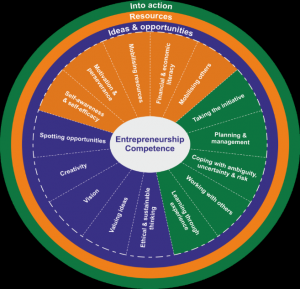
Simon Finley
Aston University
13th November, 2019
A number of years ago I was invited to attend a workshop on the teaching philosophy of Team Academy (https://www.akatemia.org.uk/what-is-team-academy/). This is a UK based trust set up with the aim of encouraging universities and colleges to adopt a radical Finnish approach to business education. Students work in team companies and run their own business. In the place of seminars and lectures they participate in coaching sessions. There are also no exams; instead students are required to complete a range of relevant, competence building tasks and assignments.
In the context of the Higher Education (“HE”) system that I am familiar with this seemed like a risky venture and one that was unlikely to be welcomed with open arms by colleagues. However, the opportunity to meet with students on such programmes convinced me it was a risk worth taking. They were confident, articulate and had a wealth of commercial experience running their own companies. What was even more impressive was that they appeared to have a much more sophisticated understanding of the management frameworks and tools introduced in normal undergraduate degree courses. By reading about these, applying them to their own businesses and reflecting on their use they demonstrated a deep level of learning that I had not come across teaching on more traditional courses.
With my interest piqued I began researching entrepreneurship and enterprise education. It appears that this is of significant interest to the political community. Entrepreneurship and initiative are two of the European Union’s Key Competences for Lifelong Learning (European Communities, 2007), which they identify as critical to the development of a competitive EU workforce. In response, the UK Quality Assurance Agency (2007) provided guidance on the desired attributes of HE entrepreneurship and enterprise education, as follows:
“……….the process of developing students in a manner that provides them with an enhanced capacity to generate ideas, and the behaviours, attributes, and competencies to make them happen. It extends beyond knowledge acquisition to a wide range of emotional, intellectual, social, cultural and practical behaviours, attributes and competences, and is appropriate to all students.”
(pg . 9)

The Entrepreneurship Competence Framework taken from Bacigalupo et al (2016, p. 6)
While such aspirations were widely supported there was a lack of agreement on what the “behaviours,” “attributes” and “competencies” actually were. To remedy this the EU created an entrepreneurship competence framework, illustrated above, commonly known as “Entrecomp” (Bacigalupo et al, 2016).
Armed with this new understanding I looked afresh at the programmes on offer at Aston. We have a rich entrepreneurial heritage and, through various start up/small business support mechanisms, including enterprise placements, societies, the Aston Centre for Growth and the Birmingham Skills for Enterprise and Employability Network (“BSEEN”), we have supported many successful entrepreneurial ventures. Despite this there is little emphasis on the development of entrepreneurial competence in the curriculum. As with most business schools, we have a number of entrepreneurship programmes but these are largely classroom based and focussed on developing knowledge and understanding rather than applied skills.
Given this gap, the entrepreneurial positioning of Aston University and the current economic and political climate, and with a new found entrepreneurial spirit, I decided it was time to take a risk and reinvent the approach to entrepreneurship education at Aston. I began the process of validating a Team Academy programme of our own.
To support the development process I joined the Team Mastery programme run by Akatemia. The purpose of this is to coach the coaches in the philosophy and techniques of entrepreneurial team coaching. As part of this programme you visit a number of universities across Europe delivering these programmes. So as well as personal development you get to meet programme directors, tutors, students and alumni from a wide variety of institutes to help understand the challenges and barriers in the way to developing such radical programmes but also to witness first-hand the remarkable successes that they have achieved. It was a transformational experience!
2018 was a blur of training, programme approvals, open days, school outreach events and applicant interviews. Being such a different programme it is vital to talk to potential applicants, parents and tutors to explain the differences to more “traditional” programmes. While the sound of no lectures and exams may sound appealing, this is by no means an easy course. Students have to work together to create, launch and grow commercial and social enterprise projects and many will find this “doing” component of the programme tough. Others, however, thrive in this environment and very often they are the sorts of students who might struggle in a traditional academic environment. So as well as developing important skills and competencies these programmes also open up HE to a wider range of students than was previously the case.
The first BSc Enterprise Development students joined the programme in September 2019. It was a momentous occasion in my career and a game changer for enterprise education at Aston. Throughout this first year I will follow the progress of the programme, it students and staff, warts and all, in my blog. The adventure begins…………………………………………
Simon Finley
Simon Finley, Associate Dean and Team Entrepreneur Coach at Aston Business School, is working with Cranfield University colleagues within the Centre for Innovation in Learning and Education (CILE). The joint virtual centre aims to develop new knowledge in innovative education, business-engaged educational design and innovative delivery modes in undergraduate provision within UK Higher Education. Through joint research, the sharing of best practice and the design of innovative education pathways, Aston and Cranfield Universities are supporting the proposed development of a new model STEM-focused university in Milton Keynes.
This blog has been produced for the Centre for Innovation and Learning in Education, a Catalyst OfS funded project.
Bacigalupo, M., Kampylis, P., Punie, Y. and Van den Brande, G., (2016) “EntreComp: The entrepreneurship competence framework” Luxembourg: Publication Office of the European Union.
European Communities, (2007) Key competences for lifelong learning. European reference framework” accessed online.
[Accessed 16 May 2016]
Quality Assurance Agency (QAA), 2012. Enterprise and entrepreneurship education: Guidance for UK higher education providers.
[Accessed 16 May 2016]